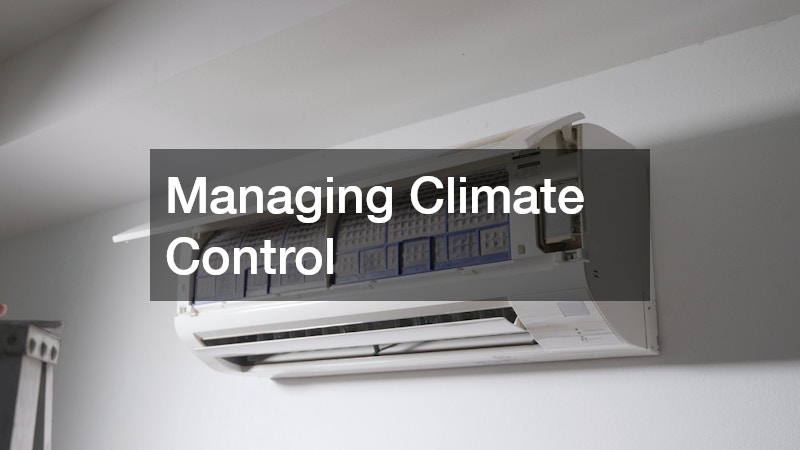Buying your first home can be both thrilling and overwhelming. There are countless new responsibilities, decisions, and financial considerations to keep in mind as you navigate this major milestone. For many first-time homebuyers, understanding the core elements of homeownership is just as important as finding the right property. You’re stepping into a world that goes beyond choosing paint colors or arranging furniture—it’s about learning how to maintain, protect, and enhance your investment.
From the foundation to the roof, every part of your new home requires some level of care, and knowing the basics early can help you avoid costly mistakes down the road. Beyond the physical structure, there are also considerations for safety, comfort, and efficiency. Things like understanding your utility systems, keeping up with seasonal maintenance, and planning for potential emergencies can make the difference between a smooth homeownership experience and one full of stress.
This guide will walk you through essential areas every new homeowner should familiarize themselves with. You’ll learn about practical upkeep, long-term investments, and protective measures that will help safeguard your home for years to come. Whether it’s understanding your home’s exterior, preparing for emergencies, or keeping systems in top condition, these house basics will equip you with the knowledge to approach homeownership with confidence.
The goal isn’t to overwhelm you with complicated technical details but to give you a practical foundation. Over time, you can deepen your knowledge, but having these essentials in mind will help you navigate everything from routine maintenance to unexpected repairs. Being informed is one of the most valuable tools a homeowner can have.
1. Maintaining Your Wastewater System

When you purchase a property that isn’t connected to a municipal sewer system, it will likely rely on a septic tank. Partnering with trusted septic companies ensures that your system is pumped and inspected regularly. This prevents backups, foul odors, and costly repairs. As part of your house basics, it’s important to keep records of when maintenance was last performed and schedule service every three to five years, depending on household size and usage.
Routine care also means being mindful of what goes down your drains. Avoid flushing anything that could clog the system, and limit the use of harsh chemicals that can disrupt natural bacterial processes inside the tank. Using septic-safe toilet paper, installing drain screens, and spacing out laundry loads can all help your system run more efficiently.
It’s also wise to learn the location of your septic tank and drain field so you can protect these areas from vehicle traffic or excessive water runoff. Landscaping choices matter here—roots from trees or shrubs planted too close can damage the system over time. Being proactive not only protects your home but also preserves your property value and keeps your wastewater system functioning smoothly for decades.
2. Preparing for Power Outages
Power interruptions can be inconvenient or even dangerous, especially in extreme weather. Investing in home generators provides peace of mind, allowing essential appliances and systems to keep running. Among the most critical house basics is knowing how to operate and maintain this equipment. Generators should be tested periodically, fueled as required, and kept in a dry, well-ventilated area.
Consider your household’s unique needs—medical devices, refrigerated medications, or remote work requirements—when determining the right size and capacity. While portable units may be enough for occasional outages, standby generators offer seamless, automatic switching during blackouts. Either way, preparation today can prevent emergencies tomorrow.
It’s also smart to create an outage plan that covers more than just the generator. Keep flashlights in accessible spots, stock extra batteries, and have non-perishable food and bottled water on hand. Being prepared means you won’t have to scramble when the lights go out, and it can help keep your family calm and safe during prolonged power disruptions.
3. Protecting Your Home’s Exterior
Your home’s siding does more than enhance curb appeal—it serves as a protective layer against weather, pests, and moisture. Choosing the right house siding and keeping it well-maintained is one of the often-overlooked house basics that can prevent structural issues. Regularly check for cracks, warping, or mold growth, and address problems promptly to avoid larger repairs later.
Cleaning your siding annually helps preserve its appearance and integrity. Depending on the material, you may need to use specialized cleaning solutions or hire professionals for more thorough treatments. Vinyl siding might only need a gentle wash, while wood siding may require repainting or sealing every few years to guard against moisture damage.
Paying attention to gutters, downspouts, and drainage also plays a role in protecting your siding. If water consistently splashes or pools near your foundation, it can lead to siding deterioration and even structural damage. By understanding your siding’s maintenance requirements, you’ll extend its lifespan and safeguard the investment you’ve made in your home.
4. Caring for Pools and Outdoor Water Features

If your new home includes a pool, maintaining proper water chemistry is crucial for safety and equipment longevity. A key part of pool ownership is understanding ph balance pool maintenance. Monitoring the pH regularly ensures water remains comfortable for swimmers and prevents damage to pool surfaces and filtration systems.
In addition to balancing chemicals, skim debris, vacuum the pool floor, and clean filters as needed. Seasonal opening and closing procedures also help protect your investment. This includes covering the pool in the off-season, winterizing plumbing lines, and ensuring pumps are serviced before the first swim of the year.
For those new to pool ownership, it’s helpful to keep a log of maintenance tasks. This record will help you track trends and catch problems early. As part of your house basics, treating pool care as a routine task rather than an occasional chore will save you time, money, and frustration over the long term.
5. Inspecting and Maintaining the Roof
A well-maintained roof is essential for protecting your home’s structure and interior. Hiring a professional roofing service for periodic inspections is one of the smartest preventive measures you can take. They can identify damaged shingles, flashing issues, or signs of leaks before they turn into expensive repairs.
House basics include knowing the type of roofing material you have, its typical lifespan, and how to perform visual inspections yourself. Keep gutters clear, watch for moss or algae growth, and check the attic for signs of water intrusion. If you live in an area prone to storms, it’s wise to schedule an inspection after severe weather.
You should also understand your roof’s ventilation system, as proper airflow helps regulate temperature, prevent ice dams, and reduce moisture buildup. Addressing small issues quickly can significantly extend your roof’s life and protect your home’s value.
6. Keeping Indoor Systems in Balance
Maintaining a comfortable living environment requires attention to multiple systems, from heating and cooling to air quality. Part of your house basics is understanding how these systems interact and when they need professional servicing. Regular filter changes, seasonal tune-ups, and monitoring humidity levels can prevent bigger issues.
Whether you’re adjusting thermostat settings for efficiency or sealing drafts to maintain temperature, small steps add up to greater comfort and energy savings. You might also consider investing in smart home technology to help regulate indoor climate automatically, ensuring optimal comfort without wasting energy.
By keeping a consistent schedule for maintenance, you’ll prevent costly breakdowns and improve the overall air quality in your home. This can make a noticeable difference in comfort, especially for households with allergies or respiratory sensitivities.
7. Managing Climate Control

Your heating and cooling systems play a vital role in maintaining comfort year-round. Partnering with reputable HVAC companies ensures your units operate efficiently and safely. These professionals can detect potential problems early, recommend upgrades, and advise on proper maintenance schedules.
House basics in this area include knowing the location of your system’s shut-off points, understanding thermostat programming, and keeping outdoor units clear of debris. Energy efficiency not only lowers utility bills but also reduces wear and tear, prolonging the life of your HVAC equipment.
Consider scheduling inspections in the spring and fall, before the heavy demands of summer cooling or winter heating. This timing allows for any necessary repairs to be made before extreme temperatures arrive.
8. Addressing Plumbing Needs
From fixing leaky faucets to replacing pipes, plumbing issues can escalate quickly if ignored. Working with reliable local plumbing companies helps you resolve problems before they become emergencies. Understanding your plumbing layout and knowing where your main shut-off valve is located are critical house basics every homeowner should master.
Routine checks under sinks, around toilets, and near water heaters can reveal leaks early. Additionally, installing water sensors in vulnerable areas offers extra protection against costly water damage. For homes in cold climates, insulating exposed pipes can prevent them from freezing and bursting during winter months.
Taking time to learn how to address minor plumbing issues yourself—like replacing a washer in a dripping faucet—can also save money and reduce stress.
9. Preventing Pest Problems
Unwanted pests can damage your home and compromise your comfort. A relationship with a trusted local exterminator can be invaluable in addressing infestations promptly. As part of your house basics, inspect entry points such as vents, windows, and doors for gaps, and seal them to deter critters.
Regularly trimming vegetation near your home, keeping food stored securely, and scheduling periodic pest inspections are all smart preventive measures. Pests are more than a nuisance; some can cause structural damage or pose health risks.
Early action is key—once pests become established, they can be much more difficult and costly to eliminate.
10. Understanding Home Safety Essentials

Safety extends beyond locks and alarms—it includes structural integrity, fire prevention, and hazard awareness. Among house basics, learning how to check smoke detectors, test carbon monoxide alarms, and identify potential hazards is critical.
Emergency plans, clear exits, and organized utility shut-off procedures keep your household prepared for unexpected events. You should also keep a well-stocked emergency kit with essentials like first aid supplies, water, flashlights, and important documents in a waterproof container.
Making safety checks a seasonal habit ensures that your home remains secure year-round.
11. Enhancing Kitchen and Bathroom Features
Updating spaces like kitchens and bathrooms can boost both comfort and resale value. Installing custom countertops offers a chance to personalize your home while improving functionality. House basics here include understanding different materials, their maintenance requirements, and how to protect surfaces from damage.
Similarly, frameless shower doors in bathrooms can modernize the look and make cleaning easier. When upgrading these features, consider durability, ease of upkeep, and style to get the most value from your investment.
Small changes like new lighting, updated fixtures, or improved storage can also enhance these spaces without requiring major renovations.
12. Combining Function and Style in Home Upgrades
As you settle into your new home, combining function with aesthetics can enhance both livability and property value. Upgrades such as frameless shower doors provide a sleek, modern feel, while still serving practical purposes like reducing water splashing and making cleaning simpler. Within house basics, knowing which improvements offer both immediate enjoyment and long-term ROI is key.
This extends beyond bathrooms. You might choose flooring that withstands heavy foot traffic, lighting that improves both mood and efficiency, or outdoor spaces that encourage relaxation. The best improvements balance style with everyday needs, ensuring they remain appealing for years to come.
Thoughtful, well-planned changes are often the difference between a house that’s simply livable and one that truly feels like your own. Planning upgrades with future resale in mind will help your home remain competitive in the market, while also reflecting your personal taste and lifestyle.
Becoming a first-time homeowner is more than just signing a mortgage—it’s an ongoing journey of care, improvement, and learning. By familiarizing yourself with house basics early on, you equip yourself to handle challenges before they escalate. Whether it’s keeping systems in working order, planning upgrades, or preventing problems through regular inspections, each step you take strengthens your home’s longevity and value.
The more you know about your home’s needs, the more confident and capable you’ll feel. These habits not only make daily living more comfortable but also protect your financial investment. As you settle into your role as a homeowner, keep building your knowledge and refining your skills. Over time, these practices will become second nature, allowing you to enjoy the rewards of homeownership without the constant worry of what might go wrong.







